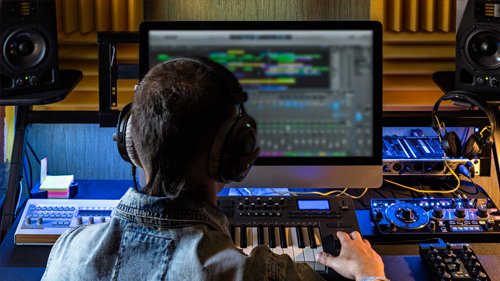What Are the Basic Steps of Music Production?
Regardless of the type of music that is being made, every artist wants their audience to appreciate their creation. Yes, creative satisfaction might be their priority. However, when the music you create is equally liked and appreciated by your audience, it is definitely a rewarding feeling. There is no hard and fast rule to producing music. However, every musician needs to go through some common steps to bring life to the lyrics and the music they have composed. If you are unaware of the various technicalities involved in the music production process, you may hire a professional music producer at a recording studio in Singapore for the much-needed help. This blog will discuss the different steps involved in music production.
6-steps music production process
Ideally, the music production process takes place in 6 basic steps. Let's learn more about the activities involved in each step.
Songwriting
The first step of creating music is writing the lyrics of your song and composing the music for it. In this stage, the music composition process involves creating the structure of your song. It includes creating the melody, harmony, and rhythm of your song. These aspects help determine the vibe, genre and style of your song. The key aspects you need to focus on in this songwriting or composition stage are as follows:
Writing lyrics
Decide on the tune, melody, rhythm of your song
Determine the musical instruments to be used while creating the song
Decide on the music for each verse of your song
Some recording studios also offer artists creative space to provide an ideal ambience to write songs and compose music at the primary level.
Arranging
In this stage, you need to work on your strong structure based on the basic ideas that you have decided on in the first stage. It means that you need to work on the intro, verses, choruses (if any) and other parts of your song. You may also decide to introduce new musical instruments or remove the ones you have decided on earlier. The point is to experiment with different musical arrangements to build on the feelings of the song. A well-arranged song can effectively drive and hold your listener's attention to make them feel the emotions of your song. In short, arranging your song means improving its appeal to your audience.
The areas where you need to work as a part of this step are as follows:
Song structure - Ensure that every section of your song can be separated from each other.
Transition - Ensure that your song transition well from one section to the next.
Empty space - Ensure that your song doesn't have any empty space.
Variation - Add the necessary music variations to your song to prevent it from sounding dull or flat.
Harmony - Ensure that all the music elements in your song sound good together.
Duration - Ensure that your song doesn't have long repetitive sections that might cause listeners to lose interest.
While arranging your music, it is important to ensure that the added production elements serve the song well and not convolute the listening experience. Sometimes, in your attempt to make your song sound interesting, you may want to include various types of arrangements or additional sounds. Doing so can make your song sound dense and complicated at the cost of confusing the listener. It is often advisable to hire professional music producers and audio engineers at a music studio rental in Singapore for proper music arrangements. Because of their experience and expertise, they can guide you in this step of music production while also providing an objective opinion on your song.
Tracking
Tracking in simple terms, refers to the music recording process. The purpose of this step is to record your song performance.
Till now, everything that you have worked on is based on your musical thoughts and ideas. The first step to making your ideas into a reality is to record the song. While playing a song live can be entertaining to your audience, recording it will allow your audience to listen to them on repeat.
In this step, each track of your song should ideally be recorded one at a time which is termed as multi-track recording. As a result, you will be building up the song track by track, often while using a tempo mapped metronome as a reference to the speed of the song.
While your focus during the songwriting and arranging stage is mainly on your song's creative aspects, recording is all about the performance. It means how you are presenting your song to your audience. While performing, you have to use your voice and music to express all your emotions clearly. The performance is of utmost importance as your audience can feel your emotions through your performance and delivery of your musical expression. The next stage, i.e., the editing stage, involves correcting possible mistakes to improve your performance. However, none of the other stages of music production that we will discuss below can add emotion to your song if it's missing in your performance. Hence, in this stage, you can hire professionals at a recording studio to take care of the technicalities of music recording while you can focus entirely on performing.
Editing
There are reasons why you should give adequate importance to the editing step of music production. As we have mentioned earlier, each music production stage has a specific purpose. While creating, performing and recording music, your focus should be on those particular aspects. You should not concern yourself with editing in the first three steps. Once the recording process is completed, you can focus on editing.
In this regard, you must bear in mind that the purpose of editing is to improve the way your song sounds. You must refrain from overdoing it. If your music sounds fine, then you need not require unnecessary tweaking. Instead, focus on adjusting the pitches or smoothing the tone of your song. The professionals at a music recording studio can take care of the editing stage of a music production and they can do it faster and more precise due to their vast editing experience.
Mixing
This step involves mixing different layers of your song to create one final track. The purpose of this step is to ensure that all parts of your song sound good together.
The professionals at a music studio rental in Singapore can help in the song mixing aspect of music production. In this step, professionals might add effects, equalization, and compression to your song. A well-mixed song will help the musical intent of the song to be delivered to your audience as per how you envisioned it to be. Various crucial decisions are made during the process. For instance, you can decide which elements of the sound to be the main focal point by bringing it to forefront while allowing others to play in the back. When mixed properly, your audience will appreciate the final version of your song.
Mastering
It is the final stage of music production. Sometimes, artists use multiple studios to record different songs. As a result, the purpose of the mastering stage is to ensure that all the songs sound coherent and are part of the same album. A professional mastering engineer can quickly identify the deficiencies, even the minor ones, during the mixing stage. They will balance the sound level of the individual song accordingly to make them sound as if they are part of the same album.
VERTA Collective is a recording studio in Singapore that helps in music production and various audio post-production facilities and services. You will get a chance to work with our team of professional music producers and audio engineers while recording your song. You can bring your song to the next level in terms of the quality with our expertise and produce a competitive track that can rival commercial records, allowing you to stand out in a densely populated music industry.


